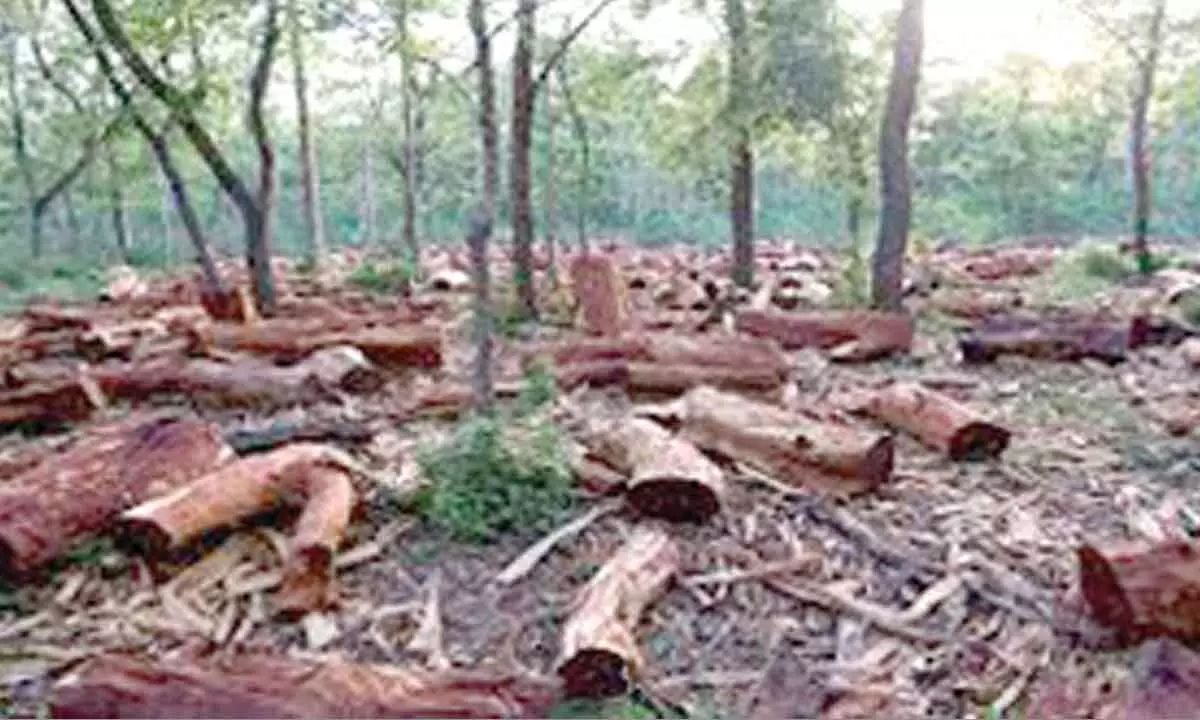Green Tribunal sees red over deforestation

National Green Tribunal has observed that conservation of the forest areas would not just be the protection of the trees and the greenery but also the rich biological diversity, wildlife habitats, and the entire ecology which has evolved over centuries that sustain varied flora and fauna and wildlife including the numerous tribal communities inhabiting the areas.
The National Green Tribunal has observed that conservation of the forest areas would not just be the protection of the trees and the greenery but also the rich biological diversity, wildlife habitats, and the entire ecology which has evolved over centuries that sustain varied flora and fauna and wildlife including the numerous tribal communities inhabiting the areas.
The NGT eastern zone bench made the observation recently while dealing with a plea alleging indiscriminate felling of trees in a reserved forest area which is part of Papum Reserved Forest, and part of Pakke Tiger Reserve in Arunachal Pradesh.
The petitioner alleged that the authorities did not take any steps against the indiscriminate felling of trees which is likely to create human-animal conflict and that may affect even the life of tigers in that area. The plea also said this forest area is a hornbill breeding and nesting site. "There is no gainsaying that the state is the trustee of its natural resources and in that capacity, it is expected to discharge the responsibility which the Constitution of India has reposed upon it under Article 48A," the green court observed. It further directed a High-Level Committee by the Chief Secretary, Arunachal Pradesh, to regularly monitor the green coverage in the state including restoration of the water bodies which have shown a drastic decrease between 2009 and 2019. The Committee if required may also deliberate common issues with its neighbouring states, like Assam.
Staff shortage
In 2019, after finding the failure of the authorities in the matter, the tribunal had directed to constitute a High-Level Committee headed by the Chief Secretary to look into the illegal felling of trees and deforestation taking place. Again in November, 2020, noting the state government's submission that the shortage of manpower in monitoring the illegal tree felling, the tribunal directed recruitment of forest staff on an urgent basis and also identify the hotspots where the illegalities are rampant.
In December last year, the state government said 33 newly recruited Range Forest Officers have been given offer of appointment. Further, for 159 posts of Foresters and 10 posts of Forest Guards requisition has already been sent to the Staff Selection Board for conducting recruitment and a further request for creation of 200 new posts of Forest Guards in the Department has already been sent to the Department of Administrative Reforms for approval, it stated.
The total area amassing the whole forest cover of Arunachal Pradesh is divided into five classes which are water, non-forest, scrub, open forest, moderately dense forest and very dense forest. A comparison between 2009 and 2019 in Arunachal Pradesh shows an overall decrease of 934.97 sq. km in moderately dense forest, an overall increase of 273.7 sq. km in open forest and very dense forest. This indicates a net change of 661.27 sq. km in the negative.
Petitioner submitted that increase in non-forest area and decrease in moderately dense forest does not present a very encouraging picture for the state of Arunachal Pradesh but increase of 244.09 sq. km in very dense forest and 29.61 sq. km in open forest which is certainly very encouraging but the state still required to take immediate and urgent steps for preventing decrease of moderately dense forest.








